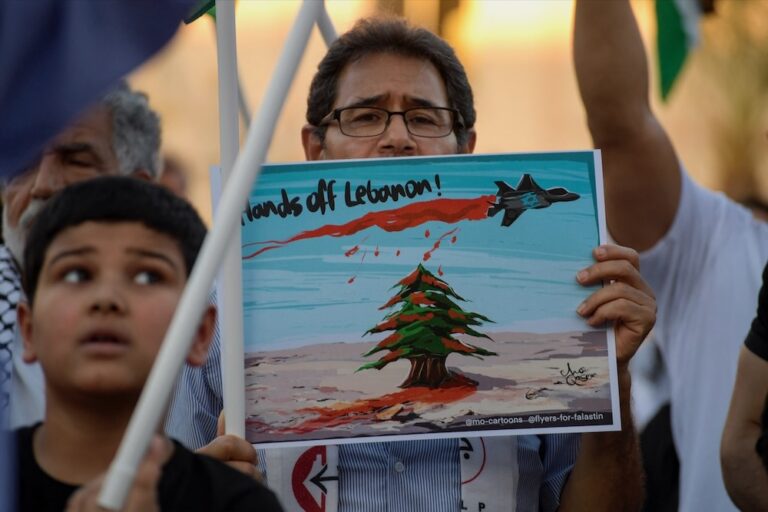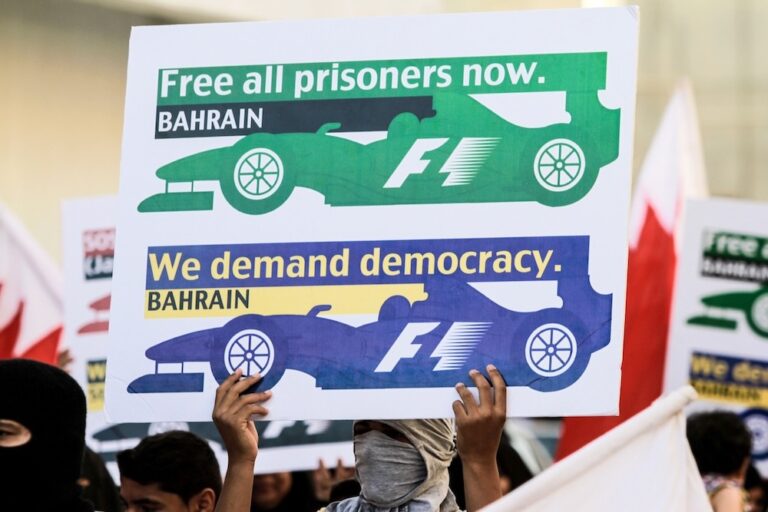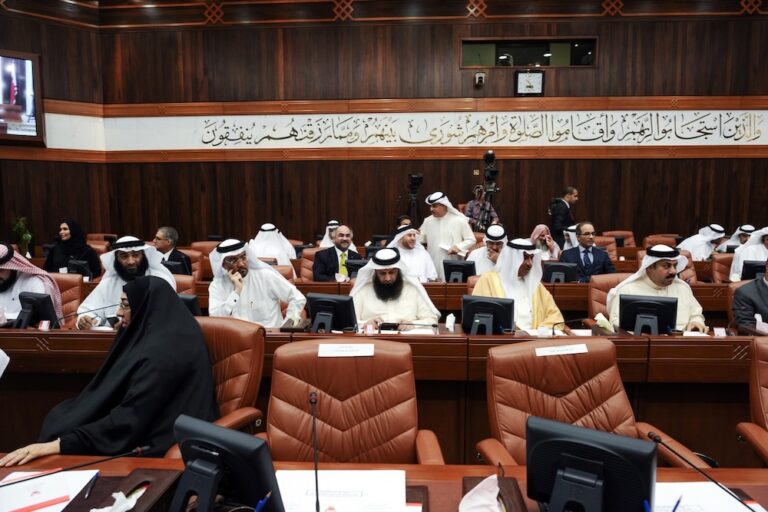Concerns were raised at the 57th UN Human Rights Council about repression in Bahrain and Saudi Arabia, urging accountability and safeguarding free expression.
This statement was originally published on adhrb.org on 22 October 2024.
Americans for Democracy & Human Rights in Bahrain (ADHRB) participated in the 57th session of the United Nations Human Rights Council (HRC), held from 9 September to 11 October 2024.
ADHRB delivered eight oral interventions under four items during these sessions, highlighting various human rights violations in Bahrain and Saudi Arabia. It also organized a panel discussion on the sidelines of the HRC, in partnership with other human rights organizations and activists, during which the misuse of INTERPOL Red Notices and its implications for human rights were raised.
ADHRB delivered seven interventions related to the human rights situation in Bahrain under items 2, 3, 4, and 5. Under item 5, it delivered an eighth intervention, highlighting the issue of executions in Saudi Arabia.
Item 2
Under Item 2, ADHRB delivered two interventions during the General Debate on 12 September 2024.
ADHRB delivered its first intervention during the General Debate under Item 2, highlighting the ongoing detention of elderly Bahraini opposition leaders and human rights defenders. These individuals have been imprisoned since 2011 for their peaceful opposition to the autocratic rule in the country. The intervention noted that, despite the issuance of three recent royal pardons, none of the opposition leaders or prominent human rights defenders were included. Among those excluded were Mr. Hasan Mushaima, Dr. AbdulJalil AlSingace, and AbdulHadi AlKhawaja. ADHRB called on the Bahraini authorities to immediately and unconditionally release all elderly opposition leaders and prominent human rights defenders.
Under the same item, ADHRB and partner organizations delivered an intervention during the General Debate, drawing the Council’s attention to the ongoing impunity of Bahraini officials responsible for torture and other human rights violations in Bahraini prisons. The intervention noted that despite the three recent royal pardons, none of the perpetrators of rights abuses have been held accountable and that, the same violations persist. ADHRB also held Bahrain’s King Hamad bin Isa Al Khalifa, Crown Prince Salman, and Interior Minister Sheikh Rashed bin Abdulla Al Khalifa responsible for the growing culture of impunity. ADHRB urged the Council to pressure Bahrain to end impunity for rights abusers.
Item 3
Under Item 3, ADHRB delivered two interventions on 13 and 20 September 2024 during the General Debate and Interactive Dialogue with the Independent Expert on the enjoyment of all human rights by older persons.
In the intervention delivered during the Interactive Dialogue with the Independent Expert on the enjoyment of all human rights by older persons on 13 September 2024, ADHRB and its partner organizations addressed the ill-treatment and human rights violations faced by elderly human rights defenders in Bahrain. It noted that elderly prisoners of conscience have been held in Bahraini prisons since 2011, some serving life sentences. All these individuals have faced numerous violations, documented by UN experts, including arbitrary detention, torture, ill-treatment, and denial of medical care. Among them are 76-year-old opposition leader Hasan Mushaima, prominent human rights defender Dr. AbdulJalil AlSingace, who is over 62 years old, and human rights defender AbdulHadi AlKhawaja. ADHRB concluded by addressing the Independent Expert on the enjoyment of all human rights by older persons, asking: When will Bahrain implement its obligations, address the recommendations, and allow UN delegations to monitor prison violations?
In the intervention delivered during the general debate under Item 3 on 20 September 2024, ADHRB affirmed that there can be no reform without releasing political prisoners and human rights defenders, securing justice, and ensuring accountability. It also drew the Council’s attention to the rising numbers of summons, arrests, and trials related to freedom of expression, occurring alongside the recent releases in Bahrain.
ADHRB pointed out that with the onset of demonstrations in support of Gaza in October 2023, Bahrainis are living in a new and dangerous escalation of repression. Widespread arrests targeted participants in popular movements, including over 50 minors, some of whom remain detained and on trial. The crackdown extends into the digital space, where dissenting opinions are criminalized.
It also drew attention to the systematic arrest campaigns and summonses launched by the Bahraini Ministry of Interior last March, targeting the families of detainees and many who expressed solidarity with the political prisoners’ strike. ADHRB also stressed that despite promises to the contrary, Bahraini authorities have yet to demonstrate a genuine commitment to a new chapter for those released. Instead, they insist on restricting their civil liberties and re-arresting or summoning anyone demanding these rights.
Item 4
Under Item 4 during the General Debate, ADHRB delivered two interventions on 25 and 26 September 2024.
On 25 September 2024, ADHRB delivered an intervention during the General Debate under Item 4, in which it emphasized the need to end impunity in Bahrain starting with dismissing the Minister of Interior. ADHRB stressed impunity for rights abuses in Bahrain keeps true reform beyond reach. It also pointed out that since 2011, 19 political prisoners have died due to medical negligence while in government facilities but unfortunately, their killers have yet to be held accountable.
Complaints against Prince Nasser bin Hamad Al Khalifa were filed for his involvement in the torture of detainees, but he continues to enjoy high-ranking positions, authority, and impunity. It also mentioned that since 2004, the Ministry of Interior has been held by Rashid bin Abdulla Al Khalifa, who has been implicated in torture yet remains unprosecuted.
ADHRB renewed its call to implement the Bassiouni Commission’s recommendations, end impunity, and remove the Ministry of Interior’s control over security and judicial bodies. This begins with dismissing the Minister of Interior, prosecuting violators, and compensating victims.
On 26 September 2024, ADHRB and partner organizations delivered an intervention during the General Debate under Item 4, in which they urged the Council to pressure Bahrain to ensure transitional justice for former prisoners. ADHRB also highlighted the hardships faced by recently released political prisoners in Bahrain as they attempt to rebuild their lives. It noted that despite their release, these individuals have received no compensation for their years of detention or the violations they endured, including torture and medical neglect. Instead, they continue to face restrictions under Bahrain’s political and civil isolation laws. At the end of its intervention, ADHRB and partner organizations urged the Council to pressure Bahrain to end these arbitrary restrictions, repeal political isolation laws, and ensure reintegration and transitional justice for former prisoners.
Items 3 and 5
During the Interactive Dialogue with the Special Rapporteur on the rights of Indigenous Peoples under Items 3 and 5, held on 27 September 2024, ADHRB and partner organizations delivered an intervention. They drew the HRC’s attention to the discrimination against the indigenous people in Bahrain. ADHRB noted that, despite their distinct cultural and historical backgrounds, both the Baharna and Ajam communities face significant economic disparities, social and political exclusion, and are disproportionately denied access to public services. It also highlighted the severe repression of the pro-democracy movement in 2011 and the revocation of citizenship for hundreds of Baharna and Ajam since 2012. These actions, coupled with unjustified deportations, reflect an alarming attempt to alter Bahrain’s ethnic balance, further marginalizing these groups both socially and economically. Considering this, ADHRB asked the HRC: How can we ensure that the Bahraini government will end the systemic discrimination against these indigenous groups and comply with international standards?
Item 5
On 1 October 2024, ADHRB and partner organizations delivered an intervention during the General Debate under Item 5, expressing deep concerns over the sharp increase in executions in Saudi Arabia. This rise underscores alarming human rights conditions in the kingdom, especially considering the lack of transparency and widespread distrust in the judicial system.
ADHRB further highlighted Saudi Arabia’s use of the death penalty to criminalize freedom of expression and retaliate against activists, as well as for offenses that do not qualify as the most serious under international standards. It urged the Council to condemn the Saudi judiciary’s use of anti-terrorism laws to criminalize free expression, as well as the use of torture to extract confessions and the execution of individuals convicted of non-serious offenses under international law. ADHRB also demanded the abolition of all such executions, including those of political prisoners and individuals convicted of non-serious offenses.
Panel on the Sidelines of the Council:
On 17 September 2024, ADHRB hosted a panel on the sidelines of the HRC discussing “INTERPOL Red Notices and Human Rights.” The event examined how Red Notices are misused to target activists and explored potential solutions to address this issue. The panel also featured case studies from the field.
During its participation in the 57th session of the Human Rights Council, ADHRB successfully highlighted some of the most serious human rights violations in Bahrain, particularly the conditions of political prisoners. It also raised concerns about the alarming rise in execution rates in Saudi Arabia, emphasizing the urgent need for intensified efforts toward their immediate abolition.



